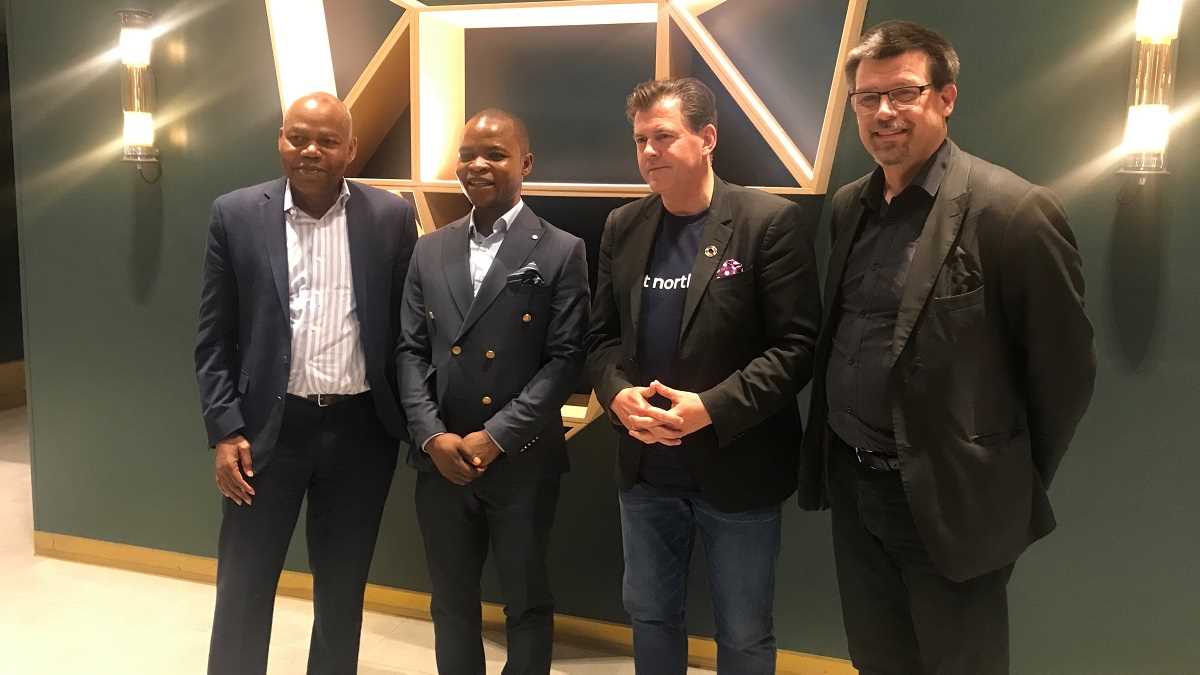In a media release in May, the network had announced how it intends to deploy its Tech Spaces to connect the African continent to Europe
HELSINKI, Finland, June 17, 2022/APO Group/ —
In a panel discussion at Aalto University’s 5G Summer School on Thursday, experts from the U.S., Africa and Europe explored the business opportunities that the latest communications and network technology, remote learning, work, and entrepreneurship from Africa can bring to U.S. companies. These are at the same time opportunities for positive impact on African economies. The webinar was organized by Start North, the Finnish technology learning accelerator network.
One prominent theme was how the 5G Mokki Tech Space network can serve international companies. In a media release in May, the network had announced how it intends to deploy its Tech Spaces to connect the African continent to Europe, promoting the learning and adoption of technology, remote work, and entrepreneurship.
In addition to promoting education, jobs, and the economic development of the regions, the network also aims to curb climate change by utilizing the latest technology.
This time, rather than focusing on the African-European connection, the discussion revolved around the possibilities of a Tech Space network for American companies that are keen on taking advantage of new opportunities swiftly. The purpose of this discussion was to highlight the diverse opportunities and benefits of the 5G Mokki Tech Space network for international companies that recruit tens of thousands of people each year and launch hundreds or thousands of innovation and technology projects each year.
‘Mokki’ is derived from the Finnish word ‘mökki’, meaning ‘cottage’. The cottage enables innovative uses of fifth generation (5G) mobile communication technology. Where 5G frequencies and networks are not yet available, Mokki works with previous-generation technologies.
Regardless of the technology it runs on, Mokki already brings knowledge and know-how related to the latest 5G technology and its application in several different areas that are important for each region. Mokki is a catalyst for the development of fixed and 5G networks across Africa, including underserved areas. Investments in fixed networks, the latest mobile technology and green energy, combined with the deployment of Mokkis to accelerate education, work, and other services, is one of the fastest and surest ways to develop regions.
The panel discussion highlighted the many benefits that collaboration with the 5G Mokki Tech Space network offers to international companies.
Professor Leonard Wantchekon from Princeton University cited China and, more broadly, Asia as an example of a region that has boosted business growth and productivity in recent decades. Known for its natural resources and large young population, Africa is the next continent comparable to Asia that will provide businesses with expertise and other resources.
The Covid pandemic has taught us the value of remote learning, work, and entrepreneurship. By taking advantage of the latest technology, new resources can be quickly made available to companies to grow their businesses and promote regional economic development. The 5G Mokki network helps with this.
Professor Wantchekon is also the founder of the African School of Economics with campuses in Nigeria, Ivory Coast and Benin, recruiting students from more than 20 African countries. He argues that 5G Mokki can play a crucial role in supporting research activities and providing cutting-edge teaching materials to studies across campuses.
Professor Marko Nieminen from Aalto University in Finland put forward that the latest network and communications technology, together with new solutions for energy and electricity, open up completely new opportunities to export know-how, work and entrepreneurship, even for underserved rural areas. This will bring more expertise and other resources to businesses.
The 5G Mokki Tech Space network has the enormous potential to serve international and local companies
Professor Nieminen elaborated on hands-on development projects such as in remote villages in Namibia and Zambia, where his research team has built electricity and energy systems as well as internet connections. Villages have rapidly moved to a new level of development. As one of the players in the Start North network, Aalto University is now utilizing the 5G Mokki network for research and education to facilitate and accelerate development.
Dr. Olatundun Adelegan from Nigeria, currently a Visiting Professor at Aalto University, presented research findings on what is slowing down or hindering Africa’s development. She highlighted infrastructure deficiencies, poor learning outcomes, and weak internet connections, youth unemployment and adverse effects of climate change and financial exclusion as hindrances to economic growth. She further explained that a robust information and technology network will lead to innovation in education and entrepreneurship and enhance financial inclusion and adoption of digital financial services and mobile money among rural dwellers as well as facilitating trade.
In addition, strong internet and digital technology will reduce the adverse effects of climate change through the provision of early warning systems on extreme weather events (floods, drought, storms, heat waves); boost agriculture yield with digital information on the onset of rainfall and sensors to monitor soil and plant conditions; minimize post-harvest loss from farm-to-fork; and enhance online nomadic education on adaptation techniques to minimize conflicts between herdsmen and farmers induced by climate change.
A robust information and technology network will contribute significantly to improving sub-Saharan Africa’s ability to create new business and attract international companies and investors.
Mr. Boris Ngala, Founder and CEO of BB Incubator in Douala, Cameroon and one of the co-founders of the 5G Mokki Tech Space network, having spent seven years abroad, returned to his home country with a vision to reduce poverty through technology-driven solutions, entrepreneurial training, and business advice.
When he heard about the 5G Mokki concept and its potential to accelerate the learning and application of new technology for the benefit of the region and its youth, he immediately seized the opportunity and set out to promote a concept that connects young people in Africa to each other and to other continents. Young people who are hungry for knowledge, learning, work, and entrepreneurship will make a significant contribution to the development of local and international business, as long as they are provided with advanced environments for learning, technological development and entrepreneurship.
Mr. Douglas Ogeto, Co-Founder and CEO of Ludique Works, the Pan-African video game publishing company in Nairobi, Kenya, said: “The 5G Mokki Tech Space network has the enormous potential to serve international and local companies, to provide creative-economy and technology-based jobs and promote entrepreneurship based on the learning of the latest technology and hands-on projects that serve local conditions. Furthermore, this is supported by extensive national and international collaboration with universities and companies.”
He is also a recent co-founder of the 5G Mokki Tech Space network. Ludique Works conducts numerous game development and business acceleration programs across Africa each year. The 5G Mokki network significantly improves the business opportunities for game developers.
Atte Leskinen, one of the driving forces behind Start North, the Finnish technology learning accelerator network, and one of the inventors of the 5G Mokki learning and technology environment, told that 5G Mokki is a concept invented by young people themselves and developed together with experienced professionals.
The concept has been tested and developed at an early stage in leading U.S. universities such as Stanford, UCLA, UC Berkeley and USC and has since been developed in cooperation with leading universities and companies in Finland and other Nordic countries.
Mr Leskinen however emphasised that the Mokki is only a tool to accelerate the learning and application of new technology. Most important are its benefits for businesses, young people and the sustainable development of the regions and our planet. Leskinen also welcomes the cooperation with African universities and business incubators and invites U.S. companies such as Microsoft, as well as universities such as Princeton University, to use the network to promote their operations and global sustainability.
The webinar was moderated by Lars Ling, founder of CleanTech Region Impact Group. Mr Ling highlighted his particular interest in developing the new kind of education needed to promote sustainable development in the world.
He ended the panel with the notion that all change starts with a change in an individual’s own behavior.
Distributed by APO Group on behalf of 5G Mokki.


 Business4 days ago
Business4 days ago
 Business5 days ago
Business5 days ago
 Events4 days ago
Events4 days ago
 Energy3 days ago
Energy3 days ago
 Energy4 days ago
Energy4 days ago
 Events4 days ago
Events4 days ago
 Business3 days ago
Business3 days ago
 Business5 days ago
Business5 days ago













